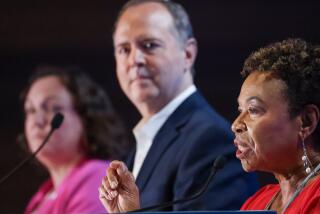Some Democrats Say Reagan Has Not Kept Pledge to Support Ratification of 2 Test Ban Treaties
WASHINGTON — Democratic leaders of the House and Senate, renewing pressure on the White House for action on two pending nuclear test ban treaties with Moscow, charged Thursday that many Democrats in Congress no longer trust President Reagan because he has not fully lived up to a pledge they say he made to support ratification of the measures.
House Speaker Jim Wright of Texas and Senate Majority Leader Robert C. Byrd of West Virginia asserted that Reagan’s credibility has suffered because he failed to keep a commitment made last October to support the treaties in the Senate early this year in return for the Democrats’ agreeing not to press for pro-arms control legislation before the Reykjavik summit meeting with Soviet leader Mikhail S. Gorbachev.
“Many of the guys are now saying, ‘We don’t trust him--he won’t keep his word,’ ” Wright declared.
The issue of the two relatively little-known treaties has become part of a political struggle over the highly charged issue of arms control, with the White House on one side and on the other side Byrd, Wright and their supporters--who include some but not all congressional Democrats.
Thus far, Reagan has submitted the two treaties to the Senate for approval, as he promised to do in letters to key members of Congress before Reykjavik. But Wright and Byrd say that in several meetings last October, Reagan committed himself not only to send the treaties to the Senate but also to work for their ratification.
GOP Votes Critical
The two Democratic leaders have been pressing the White House to help line up GOP votes in the Senate because ratification is considered impossible without substantial Republican support.
On the eve of the Reykjavik summit, Reagan argued that the Democratic legislation would restrict his freedom to negotiate. He agreed to request Senate approval of the two test ban treaties “as a first order of business” for the new Congress this year, although he specified that the treaties could not be given final approval unless Moscow agreed to additional verification measures.
In interviews Thursday, both Wright and Byrd described a tense White House meeting with Reagan on Wednesday at which Byrd told the President that he had given his word on the matter “and now I want to help you keep your word.”
But Reagan, according to Wright and Byrd, was noncommittal and apparently had not even seen a letter that Byrd had written to him on March 2 that took issue with him on several arms control issues, reminded him of the agreement reached with Democrats in October and pressed him to support the treaties.
“It was very discouraging,” Wright said.
The dispute revolves around the Threshold Test Ban Treaty, signed by President Richard M. Nixon in 1974, and the Peaceful Nuclear Explosions Treaty, signed by President Gerald R. Ford in 1976. Senate ratification would require a two-thirds vote of the Senate, and Byrd has acknowledged that without Reagan’s support they cannot be ratified.
Byrd and Senate Armed Services Committee Chairman Sam Nunn (D-Ga.) have said that ratification of the treaties would help the United States seize the initiative from the Soviets in arms control negotiations.
Democrats Divided
But the Democrats themselves are divided on the issue of the treaties. Liberal Democrats and some other arms control advocates have resisted Byrd’s effort to press for ratification because they do not support Reagan’s proviso for negotiating better verification procedures with the Soviet Union. The critics contend that existing verification procedures are sufficient and that any effort to renegotiate them would threaten the treaty.
Reagan’s closed-door meeting with Wright and Byrd and other congressional leaders had been called by the White House to discuss arms control issues and support for Nicaragua’s contra rebels, but arms control dominated the discussions. Others attending included Max M. Kampelman, chief U.S. negotiator at the arms talks in Geneva; Frank C. Carlucci, Reagan’s national security adviser, and White House Chief of Staff Howard H. Baker Jr.
Responding to a question from Byrd, Kampelman told the President that the two treaties are “valuable” and that ratifying them would be “helpful” to U.S. arms negotiators seeking broader agreements with the Soviet Union at Geneva.
Byrd reminded the President that he had strongly urged Reagan’s support of the treaties at a White House meeting last month and had followed up with a letter March 2.
“He was unfamiliar with the letter,” Byrd said, “and I handed him another copy in a sealed envelope.”
Byrd said that when he finished making his case, “the President was looking over my shoulder at (Senate Republican Leader) Bob Dole and making a face like saying, ‘What do I do now?’ And Dole pointed his finger at himself and took over. He came in with the usual stuff about how they were working on some language on the treaties.”
Byrd said he told the President that since he now is not supporting treaties he had once pledged to support, it must be because “somebody is putting something into your ear and it’s misleading you.”
Baker, according to Byrd, finally interjected that the White House was studying his letter of March 2, “that it was comprehensive and they were putting it through the process and would be getting back to me. The President said I would be getting a reply.”
Increasing Resistance
Reagan, in addition to his dispute with the Democratic leaders over the two test ban treaties, has faced increasing resistance in Congress to the broad interpretation that the Administration favors for the 1972 Anti-Ballistic Missile Treaty.
More to Read
Get the L.A. Times Politics newsletter
Deeply reported insights into legislation, politics and policy from Sacramento, Washington and beyond. In your inbox three times per week.
You may occasionally receive promotional content from the Los Angeles Times.










